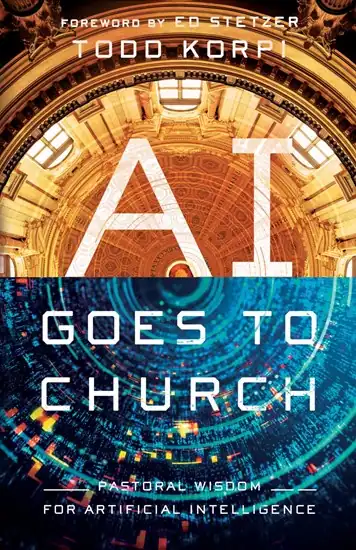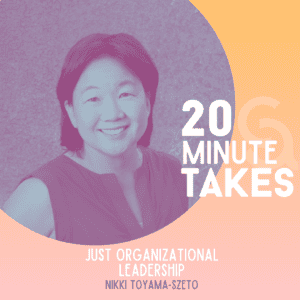 Artificial intelligence is no longer a distant possibility—it’s here, transforming our daily lives in ways both subtle and sweeping. From predictive algorithms to real-time translation, AI is shaping how we work, connect, and even imagine what it means to be human. But what does this mean for the church?
Artificial intelligence is no longer a distant possibility—it’s here, transforming our daily lives in ways both subtle and sweeping. From predictive algorithms to real-time translation, AI is shaping how we work, connect, and even imagine what it means to be human. But what does this mean for the church?
In his new book published by Intervarsity Press, AI Goes to Church: Pastoral Wisdom for Artificial Intelligence, pastor and author Todd Korpi offers a thoughtful, theological framework for engaging AI with wisdom, discernment, and a commitment to justice. We asked him to talk about the opportunities, challenges, and urgent questions AI raises for followers of Jesus today.
You write that AI presents both profound challenges and extraordinary opportunities for the church. For Christians committed to justice and spiritual formation, what do you think is at stake if we ignore AI’s rapid development?
Korpi: One of AI’s most significant dangers to us is its speed. It rapidly evolves and integrates into our lives and challenges our ability to thoughtfully consider if it should, why it should, and how it should be a part of our lives. Speed is the enemy of wisdom, discernment, and—often—human flourishing. If we haphazardly and uncritically adopt AI hastily, we risk exacerbating inequalities that already exist in society and further accelerating the pace of our lives far beyond the pace of Jesus.
Your book explores how AI intersects with human identity and the image of God. In a world shaped by automation and digital systems, how do we recover and affirm the sacredness of being human—especially for those most at risk of being devalued?
 Korpi: It’s essential that we recognize that humankind’s purpose to bear God’s image is not because of a set of characteristics or qualities we exhibit, but a designation God himself has assigned to humanity. To be human is to bear God’s image, and to bear God’s image is to be human. But this designation is one assigned to us by God alone.
Korpi: It’s essential that we recognize that humankind’s purpose to bear God’s image is not because of a set of characteristics or qualities we exhibit, but a designation God himself has assigned to humanity. To be human is to bear God’s image, and to bear God’s image is to be human. But this designation is one assigned to us by God alone.
Just like I don’t have the right to assign the Nobel Peace Prize, I also don’t have the right to assign “human” (i.e., God’s image bearer) to something other than what God has already determined. Throughout human history, whenever we’ve taken upon ourselves the authority to determine who is and is not human, grave injustice inevitably follows. It’s an authority that isn’t ours.
In the book you explore AI and social justice. What injustices might AI unintentionally perpetuate—and how can the church help ensure that emerging tech serves liberation and human flourishing, not oppression or exclusion?
Korpi: The most significant injustice AI can unintentionally perpetuate is in relation to creation care. AI servers use an enormous amount of energy which, without insistence on creation-friendly forms of energy production, will further contribute to the exploitation of the earth. But AI also can present threats to social justice in many other forms. Several AI companies are using war zones like Ukraine as playgrounds to experiment, without the regulatory oversight to which they’d be subjected elsewhere.
AI bias in hiring practices and recidivism is well documented, as is AI’s capacity to amplify the depraved underbelly of human thought (such as racial and gender stereotypes and ethnocentrism). Lastly, while AI has immense potential to alleviate the burden of work by returning margin to our schedule, it also can simply further burden working people with more toil while further enriching the ultra-wealthy who benefit from that toil.
Many in our faith communities feel unequipped to think about AI theologically. What would you say to church leaders, activists, or everyday believers who want to engage but feel overwhelmed or under-informed?
Korpi: First, I recommend reading my book—but not because I’ve figured everything out. Instead, my hope is that even if people disagree with my conclusions, it will at least start the more foundational, theological conversations we need to have. From Acts 15 on, it is through wrestling with contemporary issues together, under the guidance of the Holy Spirit, that the church has always found its anchoring in uncharted waters.
Outside of that, stay informed. Ask ChatGPT or Claude to explain concepts to you (I always add, “as if I was a fifth grader” to get the simplest response).
Some Christians fear AI; others embrace it uncritically. How do we cultivate a faithful imagination—one that resists both technophobia and techno-utopianism while staying rooted in love of neighbor and gospel witness?
Korpi: Cultivating a faithful imagination is a matter of tending to both the digital and physical aspects of our lives. Be online, sure. But observe digital sabbaths and fasts. Engage with friends on social media, but also invite your neighbors to hang out in your driveway on Saturday nights. Learn from AI, but also from the wisdom found in the writings of our spiritual mothers and fathers throughout the centuries. Play online games, but also play in the dirt outside.
We live hybrid lives, online and off, but too often we are unintentional about one aspect or another.
You describe digital space as a mission field. What are some practical, ethical ways churches are already using AI to build connection, foster belonging, or reach those historically left out of traditional ministry?
Korpi: There are incredible missional opportunities AI affords us. Some of the most significant are in bridging language barriers. AI applications now offer real-time translation so you can not only post translated sermons or other content after the fact, but also do it during your worship service.
AI can aid in helping churches better understand the community around them through demographic and internet usage patterns. There are also some great ways you can use AI as an aid in helping people in their spiritual formation journey as well.
You close the book with principles for navigating AI in ministry. If there’s one principle or practice you hope sticks with readers committed to justice, mercy, and Christian witness, what would it be?
Korpi: The first principle I mention in the concluding chapter is the one that is most important: “AI deals in knowledge, humans deal in wisdom.” We live at a time when humans simultaneously have greater access to information than ever before and also seem to be increasingly untethered from reality.
The antidote is a recovery of the value of wisdom, and Christians have a critical role to play in living as the wise, non-anxious presence in the lives of those around them. This requires that we respond to the multitude of biblical commands that compel us to pursue wisdom. God promises to give it freely, but we must pursue it earnestly.


